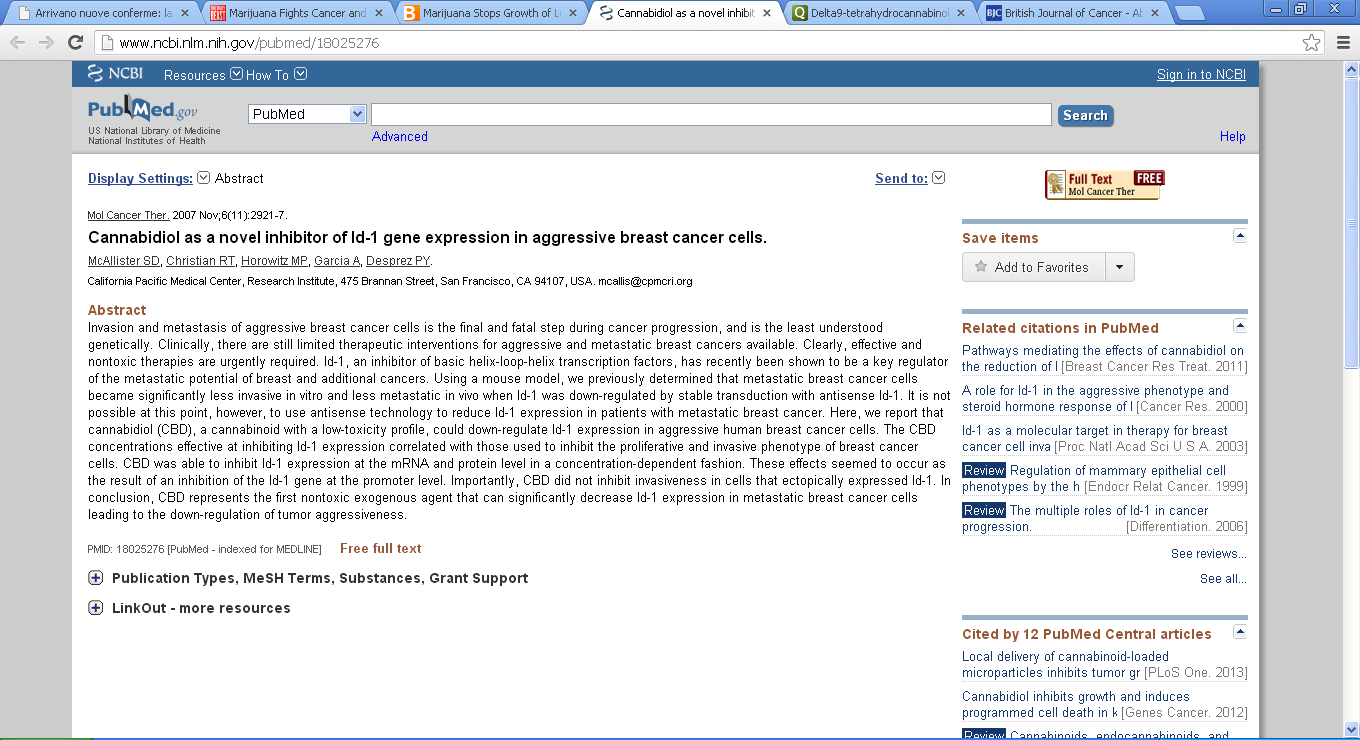Recent findings suggest that medical marijuana may be beneficial in the treatment of prostate cancer – the most common cancer diagnosed in men and the second most common cause of cancer-related death in the United States. Prostate cancer is a growing public health concern with the number of cases expected to triple over the next 10 years.

What is Prostate Cancer?
Prostate cancer is a form of cancer that develops in the prostate gland of the male reproductive system. Prostate cancer tends to affect the aging population and is believed to arise from a combination of genetic and dietary factors.
While screening methods have made great strides in recent years in identifying prostate cancer during its early stages, metastatic prostate cancer – cancer that has spread to other parts of the body – remains an important clinical problem, with 5% of prostate cancer cases presenting as a metastatic disease. Prostate cancer spreads most often to bones and lymph nodes, resulting in pain, disability and impaired daily functioning.
When prostate cancer is localized, patients are most commonly treated with surgery or radiotherapy. However, approximately one-third of patients that are treated with these conventional methods will develop metastases, at which point androgen withdrawal becomes the most effective form of therapy. Even still, prognosis for patients with prostate cancer is poor and researchers continue to pursue new lines of treatment.
How Can Marijuana Help?
In recent years, researchers have investigated the endocannabinoid system as a potential target for the treatment of prostate cancer. Studies show that cannabinoid receptors occur naturally in the human prostate and are found in even higher concentrations in cancerous prostate cells, leading experts to believe that the endocannabinoid system may be one of the body’s natural mechanisms for fighting cancer.
In 2005, researchers from the University of Wisconsin found that administration of the synthetic cannabinoid WIN55212-2 resulted in a decrease in cell viability and increased apoptosis (cell death) of prostate cancer cells. The researchers also found that, unlike cancerous cells, normal prostate cells were unaffected by the treatment.
Another study published in 2009 was able to confirm the anti-tumoral effects of cannabinoids on prostate cancer cells using a different set of cannabinoids, one which mimicked the action of anandamide – a cannabinoid that occurs naturally in the human body.
Interestingly, research shows that marijuana derivatives are not just useful in fighting the growth of cancerous prostate cells. The same 2005 study also found that stimulation of cannabinoid receptors resulted in a decrease in the expression of androgen receptors and PSA secretion. Androgen receptors are known to facilitate the progression of prostate cancer and PSAs are considered the most sensitive biomarker for prostate cancer to date – lending further support to the belief that cannabinoid-based treatments may prevent the progression of this disease.
Medical Marijuana and Cancer
The cancer-fighting properties of medical marijuana and cannabinoids are not unique to prostate cancer. In fact, cannabinoids have been found to demonstrate anti-tumoral and anti-cancer properties in a variety of cancers, including cancers of the liver, breast and lung.
Studies show that cannabinoids exert anti-tumoral effects by decreasing the viability, proliferation, adhesion and migration of various cancer cells. Furthermore, cannabinoids have been found to elicit anti-cancer effects by inhibiting cell proliferation and migration, inducing cell death, inhibiting the blood supply of tumors (angiogenesis), and modulating the immune response.
Medical marijuana provides another key benefit to patients with cancer in the form of pain relief. Numerous studies have found cannabinoids to possess analgesic properties that may be of comparable or even greater effectiveness than widely prescribed opioid treatments. Further evidence suggests that a combination of opioid and medical marijuana treatments may provide greater pain relief than either treatment on its own.
Clinical Applications
While medical marijuana remains classified as a Schedule I substance under US federal law, recent reports from national health organizations such as the National Cancer Institute (NCI) have come out in acknowledgment of marijuana’s cancer-fighting potential.
Unfortunately, clinical trials have yet to investigate the therapeutic potential of medical marijuana in prostate cancer, making it unlikely for any oncologist to consider the use of cannabinoid-based treatments at present time. However, a number of cannabinoid medications such as Marinol and Sativex have been approved for use by patients who suffer from cancer-related pain and nausea.
Source: truthonpot.com